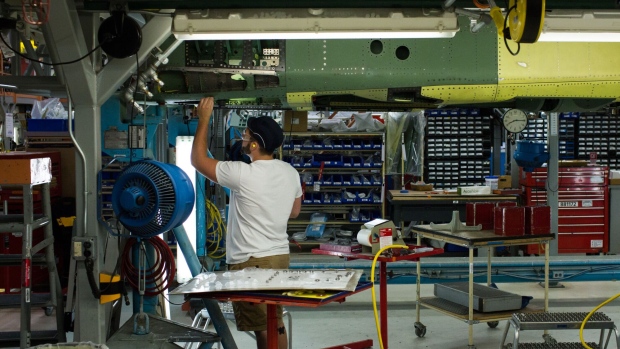Mar 5, 2024
Boeing Strikes Conciliatory Tone Ahead of Union Contract Talks
, Bloomberg News

(Bloomberg) -- Boeing Co. is seeking to avoid a disruptive labor dispute as it heads into crucial contract negotiations at a delicate moment — just as it works to address manufacturing shortcomings exposed by a near-calamity with one of its 737 Max 9 jets.
The US planemaker is striking a conciliatory tone ahead of talks that start on March 8, stressing a commitment to building a “strong future” for its employees, company and communities, according to a statement posted online on Tuesday.
“We’re confident we can reach a deal that addresses the needs of our employees while allowing us to win new business in a very competitive global market,” the company said.
The approach contrasts with contentious tactics Boeing used to win a controversial contract amendment from 32,000 Seattle-area factory workers in 2014. A decade later, union members still chafe at the arm-twisting that convinced a slim majority to agree to forgo pensions.
Union leaders intend to push for pay raises of at least 40%, emboldened by a resurgent labor movement and nationwide shortage of skilled factory workers.
“It’s about respect, balance and fair rewards for our hard work,” Jon Holden, president of International Order of Machinists and Aerospace Workers District 751 in Seattle, wrote in the March issue of Aero Mechanic, the union’s newspaper.
Holden is following the lead of auto workers in Detroit, actors in Hollywood and fellow machinists at Boeing supplier Spirit AeroSystems Holdings Inc. — now a potential merger partner. They emerged from walkouts last year with significant improvements in pay and benefits.
Read more: Boeing Workers Demand 40% Pay Raise, Escalating Output Risks
Boeing can ill-afford a lengthy strike as it works to shore up quality controls and stabilize the flow of parts from its suppliers, all while facing scrutiny from US regulators following the Jan. 5 near-miss on an Alaska Airlines flight. The latest incident has the potential to slow the planemaker’s financial recovery from crises dating back to the 2019 grounding of the 737 Max following two fatal accidents — a blow later compounded by the Covid pandemic.
The union, meanwhile, is still smarting over the 2014 deal that sacrificed pensions, locked in minimal raises and prevented workers from striking for a decade. It plans to hold town hall meetings with members next month, and has already scheduled a strike sanction vote for July 17. The present contract expires at 11:59 p.m. on Sept. 12.
Boeing is seeking to steer the talks along a path closer to that of the United Parcel Service Inc., which averted a strike last year with a five-year deal including $30 billion in new money.
Communication channels with the union have remained open and the two sides share an interest in the safety and quality of Boeing’s aircraft, a company official said.
Negotiations typically begin with non-economic items like work rules and procedures, according to Boeing. The company expects thornier economic issues like wages and benefits to be taken up around mid-year.
The outcome may also set a precedent for negotiations taking place over the next two years with machinists in St. Louis and with Boeing’s engineers’ union, the Society of Professional Engineering Employees in Aerospace.
©2024 Bloomberg L.P.


